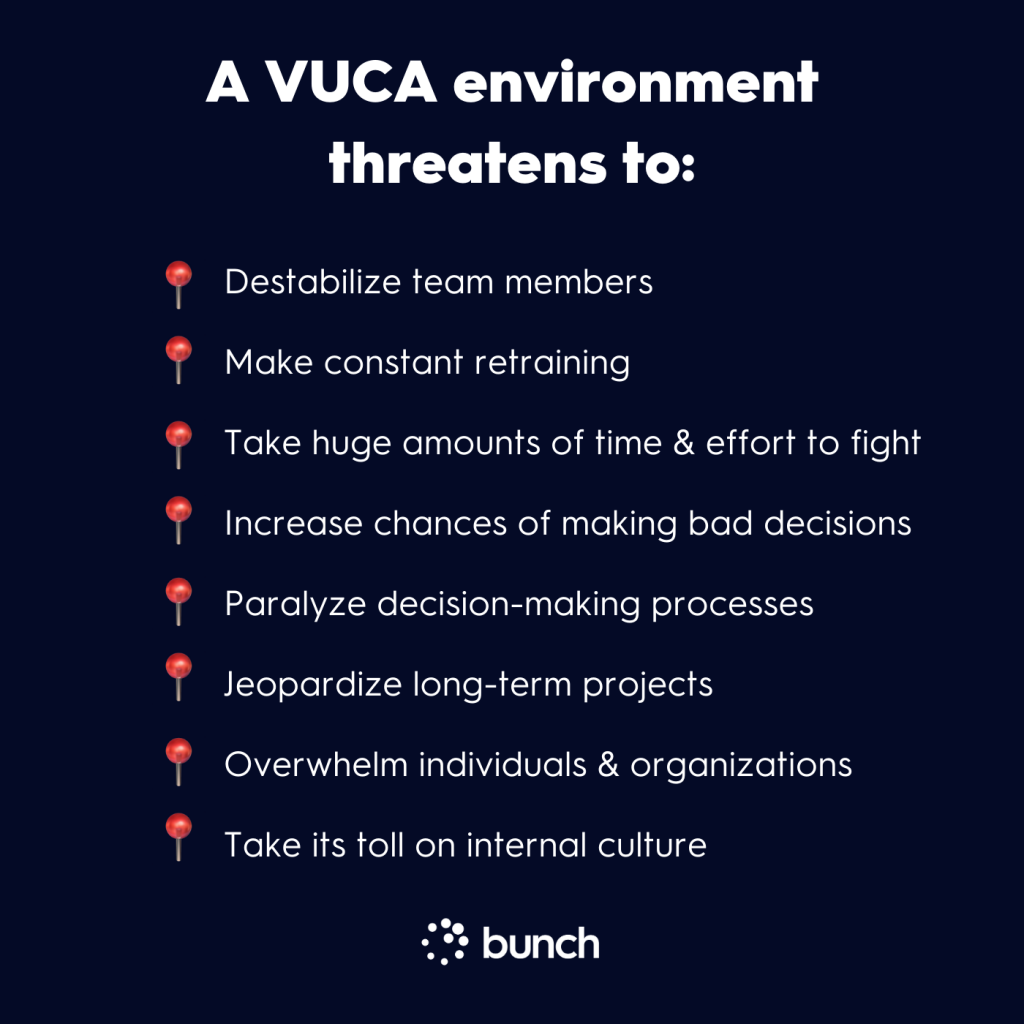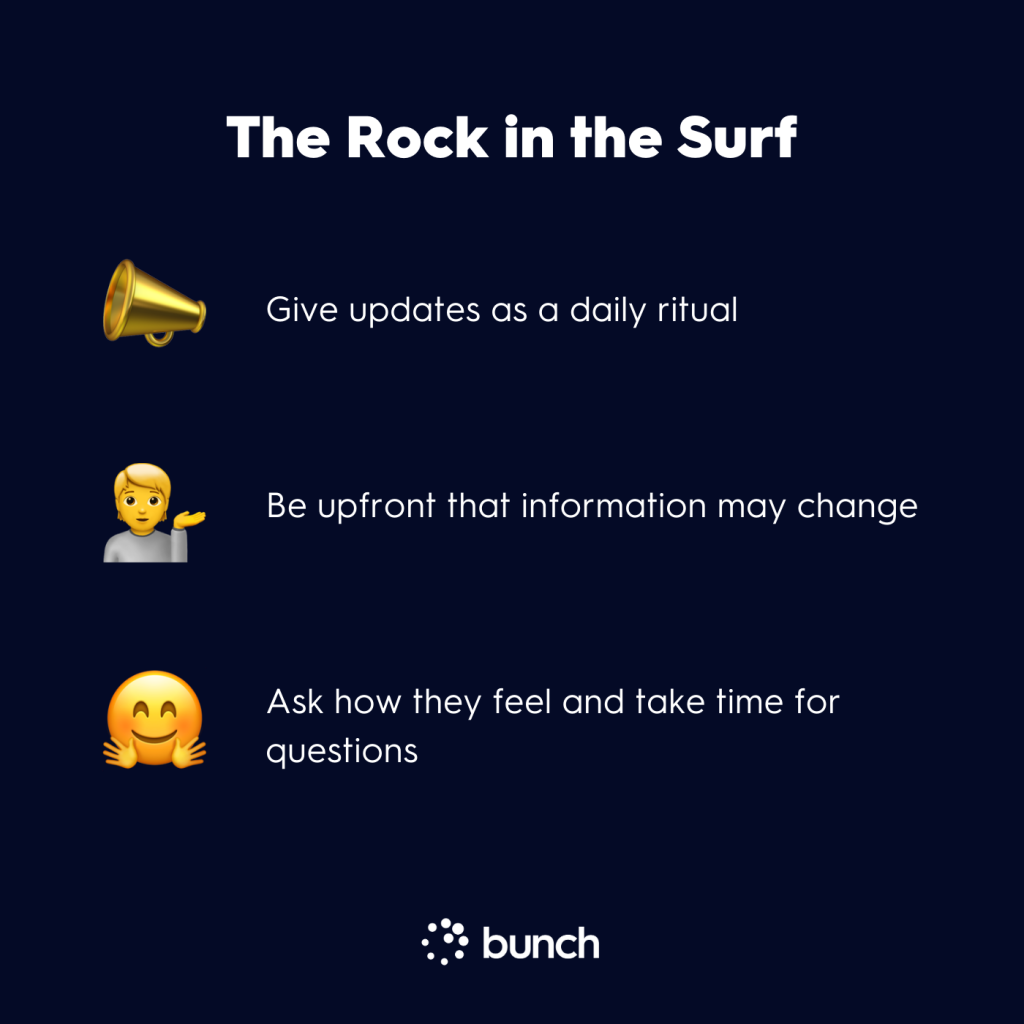We wouldn’t blame you if you’re feeling a bit anxious right now. We feel the same. It’s a realization that the stable, predictable world we once knew has been upended. We’re living in a VUCA world (stay with us – explainer coming) – one that is: Volatile, Uncertain, Complex, and Ambiguous. This new world has different demands and challenges.
What this means for leaders is that they need a new skill set, and they need it yesterday.
Our AI Leadership coach has key tips and tricks for surviving and thriving in any situation.
In this guide, we’re going to outline exactly what the VUCA world is, and how you can prepare yourself to lead in such a landscape.
To give you the best possible understanding of this new playing field, we spoke to leadership coach extraordinaire: Renita Kalhorn.
Renita is an in-demand, high-performance coach. She’s the perfect person to give us the lowdown on what leaders need to do right now to face the threats of a VUCA world. Renita has delivered leadership and development programs in the US and Asia for more Fortune 500 clients than you can shake a stick at. And, if that wasn’t enough, she also coaches military Special Forces (Green Berets and Navy SEAL candidates). Yes, she coaches Navy SEALs. (Mic drop)
Let’s get into it.
By the way… you can listen to our conversation with Renita, here! And don’t forget to subscribe to our podcast, “Teams at Work.”
Hold up, what is a VUCA world?
VUCA stands for volatility, uncertainty, complexity, and ambiguity. This star-trekky term has been kicking around since 1987 and was originally derived from the leadership theories of Warren Bennis and Burt Nanus. Since then, Bob Johansen, of the Institute for the Future, adapted VUCA for the business world in his 2009 book, Leaders Make the Future, in which he argued that you need new skills, approaches, and behaviors to manage in the face of the four VUCA threats.
So why is a 30-year-old term making a comeback?
VUCA aptly describes the world we find ourselves in now: the Covid-19 landscape has been a perfect demonstration of VUCA in action. Let’s be real though, right now with the BLM movement, politics, and the global economy we find ourselves in the perfect melting pot for these threats to take a hold on our businesses. Renita says the last few months have been an embodiment of VUCA and a signal of the future landscape not just a one-off.
It is especially important for leaders to note because to beat these threats they need to upskill.
A VUCA environment threatens to:
- Destabilize team members and make them anxious.
- Make constant retraining and reshaping a necessity.
- Take huge amounts of time and effort to fight.
- Increase the chances of people making bad decisions.
- Paralyze decision-making processes.
- Jeopardize long-term projects, developments, and innovations.
- Overwhelm individuals and organizations.
- Take its toll on internal culture.

Let’s take a look at the four VUCA threats and the challenges and tips to start tackling these challenges.
Are you struggling to keep your leadership skills sharp in a rapidly changing world? Check out the Bunch app for 2-min actionable tips!
Overcoming volatility by making things concrete
Definition: The nature and dynamics of change, and the nature and speed of change forces and change catalysts.
Challenge: Projects are ever-changing in response to environmental challenges – how do you keep your team (and yourself) on task?
When it comes to leading a team and a company, change is inevitable. From changing leadership, team members, to pivoting, new products, launches, and failures; the very essence of business is volatile. Leaders play a game of negotiating the expected and unexpected.
So, then, what do you do when the worst happens and you’re unprepared in the unexpected?
Renita says that leaders need to “stay grounded and calm during unexpected situations” and that “managing people’s attention they will be able to help their teams to stay focused”.
Renita’s tip is to start by managing yourself. To stay grounded…
Renita herself takes physical notes, as a “proof” point that conversations or actions happened. She says that the physical side of capturing notes in meetings helps to ensure you’re taking it all in.
The physical act of marking a to-do list done has a profound impact on how you feel like you have achieved for the day. A good example of this is Zoom calls, which can be so abstract. There is no record of what happens on that day or week and because of this, there’s no sense of satisfaction with the digital world which adds to the feeling of volatility.
Renita states that we don’t always have a concrete expression of the work we are doing and as humans that can be hugely unsatisfying.
2. Counter uncertainty with daily rituals
Definition: The lack of predictability, the prospects for surprise, and the sense of awareness and understanding of issues and events.
Challenge: We are uncertain and we don’t know how to say “I don’t know” because we feel like we need to have all of the answers.
“In a VUCA world, there’s no way you can know everything”
One of the key features of the last 3 months has been uncertainty. We’ve been uncertain about so many aspects of our regular lives: jobs, working set-up, lockdown, etc. We’re triggered into reacting to these moments of uncertainty in both good and bad ways. This perfectly primes us to be reactive when we should be proactive. But how do you resist the knee-jerk reaction when you’re uncertain?
Renita talked to us about the caveman instincts which are kicked into action when we are not sure of the answer. She teaches her clients to embrace the uncertainty of, say, a tricky meeting by 1) preparing for potential triggers with a game plan and response, and 2) having a sense of curiosity about the unknown.
Being uncertain does not equal being a bad leader.
Bunch Tip: The Rock in the Surf: Holding Strong During Big Changes
Whenever your team is facing uncertainty, it’s important to have at least one thing or ritual they can rely on. Here are 3 steps to create a Rock in the Surf for your team.

Find more tips like The Rock in the Surf in the Bunch app, today. Enjoy a massive library of 2-min actionable tips to boost your leadership skills.
3. Unravel complexity with common sense
Definition: The multiplex of forces, the confounding of issues, no cause-and-effect chain, and confusion that surrounds organization.
Challenge: There is always complexity within a business and projects – how do you navigate it?
Renita challenges her clients to take ego out of the picture and focus on ‘us’. Traditionally, leaders have been taught to lead with domination, but in the VUCA world, this doesn’t work.
Likewise, this outdated leadership approach does nothing when in complex situations teamwork is better than the mind of one person.
Reliance on the team mind to unravel the complexities of a project or challenge will lead to a quicker and more positive resolve. Renita adds that understanding the biological need to lead and always be in control is often an a-ha moment for clients.
Here’s a tip we like to use when struggling with a complex decision.
Bunch Tip: The Common Sense Stress Test
To prevent analysis paralysis when making decisions, use one person you trust as a Common-Sense Stress Test instead of getting lost in complexity or doing detailed analysis with limited data. Here’s how you can apply this the next time you’re unsure about what to do.
Find more tips like The Common Sense Test in the Bunch app, today. Enjoy a massive library of 2-min actionable tips to boost your leadership skills.
4. Give ambiguity the boot with clear de-briefs
Definition: The haziness of reality, the potential for misreads, and the mixed meanings of conditions; cause-and-effect confusion.
Challenge: We have hours of Zoom calls every day, we must sift through the information, plus multiple other communication channels, email, Slack, etc.
The answer to ambiguity is clarity. Leaders of today’s VUCA landscape must be masters of clarity and communication. Fuzzy information and vagaries can hinder teams from high-performance and that’s what we’re all here to do, right?
Renita’s tip:
Renita discussed with us on the podcast how the SEALs have after-action reviews after every single mission, and so should leaders. Navy SEALs are constantly evaluating their communication and effective habits, integrating them so they learn from any failings. These don’t have to be more than 15mins.
Follow the It, We, I Retro Framework:
- First focus on the ‘it’ – everything that happened relating to the task.
- Then the ‘We’ – your board, team, and stakeholders.
- Lastly on ‘I’, on you – how did you handle that situation?
- Every day ask yourself these three questions.
- Apply these learnings to the next day.
Take these compound learnings into your day – “make every day a mini-mission” says Renita.
What skills are needed in the era of VUCA?
These are the high level but very real threats that leaders will experience in a VUCA world. Now you’re aware of the challenges and you have some tips on how to deal with certain moments, the next step is to start building new skills.
At Bunch, we’re super aware that leaders need new tools to thrive in the VUCA world. We’ve been studying up, and we are integrating a new skills model into our leadership coach.
We will be talking more about this next week, and trust us you do not want to miss this information.
In the meantime, you can discover your leadership profile and start getting amazing tips directly on your iPhone today – download the Bunch Leadership Coach now.






